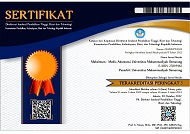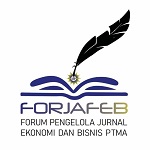Accounting Information Systems and Financial Literacy impact on SMEs' performance
(1) Universitas Muhammadiyah Magelang
(2) Universitas Muhammadiyah magelang
(3) Universitas Muhammadiyah Semarang
(4) Universitas Muhammadiyah Magelang
(*) Corresponding Author
Abstract
SMEs are a priority business sector in Indonesia because contribute to its economy by absorbing a large workforce. This study investigates factors SMEs can use to improve their business performance. Factors that are predictors for improving SMEs' performance are accounting information systems, quality of financial reports, financial literacy and business age. The population of this study were SMEs registered at the Magelang Cooperative and SMEs Service. The sampling method chosen was simple random sampling with 400 SMEs as respondents. Data analysis used Structural Equation Modeling-Partial Least Square (SEM-PLS) with the WarpPLS 8.0 application. The results of the study show that accounting information systems and the quality of financial reports positively affect the performance of SMEs, so optimizing these factors will create a competitive advantage. The financial literacy and business age variables do not affect the performance of SMEs, so they cannot be predictors.
Keywords
Full Text:
PDFReferences
Abrokwah, E., Quaye, I., Omondi, C., Osei, J., & Sarbah, A. (2015). The Use of Information Technology (IT) among Small and Medium Enterprises (SMEs) In Financial Reporting: Evidence from Ghana. British Journal of Economics, Management & Trade, 8(4), 258–269. https://doi.org/10.9734/bjemt/2015/18444
Agustin, R., Nurcahyono, N., Sinarasri, A., & Sukesti, F. (2023). Financial Ratio and Stock Returns in Indonesia Equity Markets : A Signaling Theory Approach. International Conference on Business, Accounting, Banking, and Economics, 277–292. https://doi.org/10.2991/978-94-6463-154-8
Agyei, S. K. (2018). Culture, financial literacy, and SME performance in Ghana. Cogent Economics and Finance, 6(1). https://doi.org/10.1080/23322039.2018.1463813
Ahmad, M. A., & Al-Shbiel, S. O. (2019). The Effect of Accounting Information System on Organizational Performance in Jordanian Industrial SMEs: The Mediating Role of Knowledge Management. International Journal of Business and Social Science, 10(3). https://doi.org/10.30845/ijbss.v10n3p9
Alshirah, M. H., Lutfi, A., Alshira’h, A. F., Saad, M., Ibrahim, N. M. E. S., & Mohammed, F. M. (2021). Influences of the environmental factors on the intention to adopt cloud based accounting information system among SMEs in Jordan. Accounting, 7(3), 645–654. https://doi.org/10.5267/j.ac.2020.12.013
Becherer, R. C., Halstead, D., & Haynes, P. (2001). Marketing Orientation in SMEs: Effects of the Internal Environment. Journal of Research in Marketing and Entrepreneurship, 3(1), 1–17. https://doi.org/10.1108/14715200180001474
Boonvut, S. (2017). The Quality Financial Statements of Small and Medium Enterprises Business (SME’s) in View of the Tax Auditor. International Journal of Business and Economic Affairs, 2(6), 335–340. https://doi.org/10.24088/ijbea-2017-26002
Budiarto, D. S., & Prabowo, R. M. A. (2015). Accounting Information Systems Alignment and SMEs Performance: A Literature Review. International Journal of Management Economics and Social Sciences, 4(2), 58–70. http://www.ijmess.com
Dabić, M., Lažnjak, J., Smallbone, D., & Švarc, J. (2019). Intellectual capital, organisational climate, innovation culture, and SME performance: Evidence from Croatia. Journal of Small Business and Enterprise Development, 26(4), 522–544. https://doi.org/10.1108/JSBED-04-2018-0117
Dharmawan, Y. E., & Hari Adi, P. (2021). Kompleksitas Pajak, Moral Wajib Pajak dan Norma Subyektif Terhadap Kepatuhan Perpajakan. Jurnal Penelitian Dan Pengembangan Sains Dan Humaniora. https://doi.org/10.23887/jppsh.v5i2.35699
Eniola, A. A., & Entebang, H. (2015). Financial literacy and SME firm performance. International Journal of Research Studies in Management, 5(1). https://doi.org/10.5861/ijrsm.2015.1304
Eniola, A. A., & Entebang, H. (2017). SME Managers and Financial Literacy. Global Business Review, 18(3), 559–576. https://doi.org/10.1177/0972150917692063
Fizabaniyah, R., Nurcahyono, N., Argojuwono, A. D. A., & Hernawati, R. I. (2023). Financial Ratio , Board Diversity and Financial Distress : Evidence from Indonesia. International Conference on Business, Accounting, Banking, and Economics, 1, 307–320. https://doi.org/10.2991/978-94-6463-154-8
Frimpong, S. E., Agyapong, G., & Agyapong, D. (2022). Financial literacy, access to digital finance and performance of SMEs: Evidence From Central region of Ghana. Cogent Economics and Finance, 10(1). https://doi.org/10.1080/23322039.2022.2121356
Hariyati, H., Nuswantara, D. A., Hidayat, R. A., & Putikadea, I. (2022). Management accounting information system and intellectual capital: a way to increase SME’s business performance. Jurnal Siasat Bisnis, 27(1), 61–75. https://doi.org/10.20885/jsb.vol27.iss1.art5
Hla, D., & Teru, S. P. (2015). Efficiency of Accounting Information System and performance measures – Literature review. International Journal of Multidisciplinary and Current Research, 3(Sept/Oct), 976–984. http://ijmcr.com
Kareem, H. M., Aziz, K. A., Maelah, R., Yunus, Y. M., Alsheikh, A., & Alsheikh, W. (2021). The influence of accounting information systems, knowledge management capabilities, and innovation on organizational performance in Iraqi SMEs. International Journal of Knowledge Management, 17(2), 72–103. https://doi.org/10.4018/IJKM.2021040104
Kulathunga, K. M. M. C. B., Ye, J., Sharma, S., & Weerathunga, P. R. (2020). How does technological and financial literacy influence SME performance: Mediating role of ERM practices. Information (Switzerland), 11(6). https://doi.org/10.3390/INFO11060297
Kusa, R., Duda, J., & Suder, M. (2021). Explaining SME performance with fsQCA: The role of entrepreneurial orientation, entrepreneur motivation, and opportunity perception. Journal of Innovation and Knowledge, 6(4), 234–245. https://doi.org/10.1016/j.jik.2021.06.001
Mabula, J. B., & Ping, H. D. (2018). Use of technology and financial literacy on SMEs practices and performance in developing economies. International Journal of Advanced Computer Science and Applications, 9(6), 74–82. https://doi.org/10.14569/IJACSA.2018.090611
Nurcahyono, N., Hanum, A. N., & Sukesti, F. (2021). COVID 19 Outbreak and Stock Market Return: Evidence from Indonesia. Jurnal Dinamika Akuntansi Dan Bisnis, 8(1), 47–58. https://doi.org/10.24815/jdab.v8i1.18934
Nurcahyono, N., Sinarasri, A., Pamungkas, I. D., & Hanum, A. N. (2023). May intellectual capital and corporate governance reduce the probability of financial distress?. Contaduria y Administracion, 70(1), 482.
Okafor, A., Adeleye, B. N., & Adusei, M. (2021). Corporate social responsibility and financial performance: Evidence from US tech firms. Journal of Cleaner Production, 292, 126078.
Olango, E. O. (2014). The effects of International Financial Reporting Standards adoption on SMES performance : A case study Mombasa – Central Business District ( CBD ). Research Journal of Finance and Accounting, 5(7), 94–103.
Permatasari, M., Nurcahyono, N., Bilqis, L. K., & Nugroho, W. S. (2023). The Effect of Good Corporate Governance and Financial Ratios on Financial Distress. International Conference on Business, Accounting, Banking, and Economics, 1(1), 321–336. https://doi.org/10.2991/978-94-6463-154-8
Rahma, A. M., Nurcahyono, N., & Sinarasri, A. (2022). Moderating Effects of Institutional Ownership on the Relation Between Capital Structure. International Conference on Business, Accounting, Banking, and Economics, 1, 293–306. https://doi.org/10.2991/978-94-6463-154-8
Sainis, G., Haritos, G., Kriemadis, T., & Fowler, M. (2017). The quality journey for Greek SMEs and their financial performance. Production and Manufacturing Research, 5(1), 306–327. https://doi.org/10.1080/21693277.2017.1374891
Setiawan, A., Wibowo, R. E., & Nurcahyono, N. (2021). Pengaruh Tax Avoidance, Manajemen Laba, Komisaris Independen, dan Komite Audit. Jurnal Ilmu Manajemen Retail (JIMAT), 2(1).
Shmueli, G., Hair, J. F., Ting, H., & Ringle, C. M. (2019). Predictive model assessment in PLS-SEM : guidelines for using PLSpredict. European Journal of Marketing. https://doi.org/10.1108/EJM-02-2019-0189
Sinarasri, A., & Chariri, A. (2023). Business intelligence, management control systems and startup performance: Empirical study from Indonesia. International Journal of Applied Economics, Finance and Accounting, 16(2), 234-247.
Sukesti, F., Almasyhari, A. K., Jamil, N. N., & Marzuki, A. (2022). IFRS Convergence and Disclosure Quality: The Role of Audit Quality Moderation (Study on Multinational Companies in Indonesia).
Timoty, N. F. M., Nurcahyono, N., Yasaputri, K., & Jatiningsih, D. E. S. (2022). Predicting the risk of financial distress using corporate governance measures. International Conference on Business, Accounting, Banking, and Economics, 68, 228–245. https://doi.org/10.1016/j.pacfin.2020.101334
Udriyah, Tham, J., & Ferdous Azam, S. M. (2019). The effects of market orientation and innovation on competitive advantage and business performance of textile smes. Management Science Letters, 9(9), 1419–1428. https://doi.org/10.5267/j.msl.2019.5.009
Wang, Y., Watkins, D., Harris, N., & Spicer, K. (2004). The relationship between succession issues and business performance: Evidence from UK family SMEs. International Journal of Entrepreneurial Behaviour & Research, 10(February), 59–84. https://doi.org/10.1108/13552550410521380
Ye, J., & Kulathunga, K. M. M. C. B. (2019). How does financial literacy promote sustainability in SMEs? A developing country perspective. Sustainability (Switzerland), 11(10), 1–21. https://doi.org/10.3390/su11102990
Zizi, Y., Jamali-Alaoui, A., El Goumi, B., Oudgou, M., & El Moudden, A. (2021). An optimal model of financial distress prediction: A comparative study between neural networks and logistic regression. Risks, 9(11). https://doi.org/10.3390/risks9110200
Zulfikar, R. (2023). Determinant Factors of the Quality of Financial Reports for Micro , Small and Medium Enterprises in Serang City and Their Implications for Financial Performance. Jurnal Riset Akuntansi Terpadu, 16(1), 115–126.
Article Metrics
Abstract view : 1251 timesPDF - 9 times
DOI: https://doi.org/10.26714/mki.13.1.2023.59-69
Refbacks
- There are currently no refbacks.
-----------------------------------------------------------------------------------------------------------------------------------------------------------------------------------
 | MAKSIMUM: Media Akuntansi Universitas Muhammadiyah Semarang |
![]()
Maksimum: Media Akuntansi Universitas Muhammadiyah Semarang is licensed under a Creative Commons Attribution Attribution-NonCommercial-NoDerivatives 4.0 International License.

















